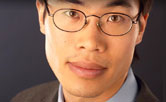|
A New Lens on God
Photography becomes a fresh lens for looking at God in this thought-provoking video by Pastor John Van Sloten of New Hope Church in Calgary, Alberta. | |
|
Please share Reflection freely by forwarding any issue, but remember to respect copyright laws by not altering, copying, or reproducing Reflection, whole or in part, without written permission. Copyright (c) 2009 Soul Windows Ministries | |
|
|
|
Corrective Lenses by Bill
I am grateful to every optician who ever ground a lens. I have worn glasses for half a century, since my third-grade teacher discovered I couldn't read the blackboard. Every driver's license has read, "Corrective lenses required." Sometimes I wonder, "Corrected to what standard?" Any lens brings certain things into focus, while distorting others. I began thinking about this last year. Tired of tipping my head back to read the computer screen through the lower portion of my progressive bifocals, I got glasses just for computer work.  What a relief! The lenses are ground to provide clear vision at just the distance from the computer screen. My eyes are far less tired at the end of a day's work. Of course, everything not at the distance of the computer screen is out of focus. To read while wearing those glasses, I have to hold the book or magazine at arms' length. Looking across a large room, I can still see where everything is, but I cannot recognize faces. Corrected to what standard? Wearing computer glasses reminds me of a story: A rabbi and his students were discussing Sabbath, which begins at nightfall on Friday. The rabbi asked, "Now, how do you tell when night has fallen? Suppose it's cloudy; you cannot see the sun set. How do you tell when night has fallen?" One student suggested that if you look at a flock of sheep, night has fallen when you can no longer see the white sheep in the darkness. Another student said, "What if there are no sheep nearby? To tell when night has fallen, I say you hold two threads in your hand, one red and one blue. When you can no longer tell them apart, that is when night has fallen." "Two good answers," said the rabbi. "Let me suggest another. Whenever you look into the face of any man and you do not recognize him as your brother, whenever you look into the face of any woman and you do not recognize her as your sister - that is when the darkness has truly come." With my computer glasses on, I cannot recognize people at a distance. What "corrective lenses" do you wear that prevent you from recognizing any man as your brother, any woman as your sister, any human being as a child of God? . |
Cultural and Spiritual Lenses
The month of September finds us in Portland Oregon, Portland Texas, and Portland Maine. Same name; different places. Same name, very different people. Not only people but very different attitudes. I noticed that as a culture, people in Oregon, Texas, and Maine see very differently when it comes to how to spend Labor Day outdoors. White-water rafting down Oregon's Deschutes River with coats on would appear weird to a bikini-clad water skier in the Texas Coastal waters. Locale and culture are very strong lenses through which people look at the world. As we look at the world may we always look through the lenses of beauty, truth, and goodness. A daily examination of conscience is much like an optician's examination, "Which is better, this...or this...?" as he flicks the lenses of different strengths. The same is true in the practice of Spiritual Direction. I've noticed in the 20+ years of giving Spiritual Direction that people come for many different reasons with many different ways of seeing things. For the most part, however, the primary focus is the same: to see God present in their lives. Many Directees seek to constantly and consciously look through the lenses of their spiritual tradition. In Ignatian spirituality, the goal is captured in this prayer: "Lord, grant that I may see thee more clearly, love thee more dearly, follow thee more nearly" (Spiritual Exercises 104). Peter Faber, one of the original companions of Ignatius of Loyola, prayed this prayer to see God in an intimate and personal way: "Cast from me every evil that stands in the way of my seeing you, hearing, tasting, savoring, and touching you; fearing and being mindful of you; knowing, trusting, loving, and possessing you; being conscious of your presence and, as far as may be, enjoying you." The beautiful thing is to realize that as you look to God, God gazes upon you with love and looks to enjoy your presence. I never thought before about God wearing lenses, but since God IS love (1 Jn 4.8) there is only one way we can be looked upon. Oh, to only be aware of the divine gaze of love. --Jan |
If you benefit from Reflection, please forward it to others. Subscription is free; just click the link below. If you choose not to receive further issues, please click Unsubscribe.
Sincerely,
Bill Howden & Jan Davis
Soul Windows Ministries | |
|
|
|